This Above All

Brief Synopsis
Cast & Crew
Anatole Litvak
Tyrone Power
Joan Fontaine
Thomas Mitchell
Henry Stephenson
Nigel Bruce
Film Details
Technical Specs

Synopsis
In England, during early days of the Second World War, Prudence Cathaway, daughter of the aristocratic General Cathaway, announces to her snobbish family that she has joined the Women's Auxiliary Force. When the Cathaways balk at her decision, Prudence lectures them on their outdated values. At the WAAF training camp, Prudence befriends Violet Worthing, who soon fixes her up with Clive Briggs, an army friend of Violet's sweetheart, Joe. Unaware that Prudence is from aristocracy, Clive declares his distaste for all of England's upper class, but Prudence falls in love with him anyway. As their romance flourishes, Clive and Prudence go on their first military leave together, taking a seven-day vacation at the Dover Grand Hotel. In Dover, Prudence runs into her aunt Iris, but the two merely exchange unfriendly glances. Fearing that her aunt will tell her family about her affair with Clive and that she will be further ostracized by them, Prudence becomes distraught. Clive, too, begins to act strangely, yelling military orders in his sleep and becoming generally distracted. Later, when Prudence reads the telegram that seemed to trigger Clive's unusual behavior, she learns only that his friend Monty is coming to visit him. Prudence later learns that Clive deserted the army after being wounded at Dunkerque, and that Monty has come to return Clive to his regiment before he is officially listed as a deserter. Clive eventually confides in Prudence that he left the service because he disliked defending England's aristocracy. Prudence responds by giving Clive an impassioned lecture about the glory of England--a speech that brings tears to her eyes and drives Clive away. Clive sets out on foot but does not get far before a farmer, mistaking him for a spy, assaults him. The bloodied Clive takes refuge at a nurse's home, but the nurse learns that he is a suspected spy and threatens to call the police. Clive then seeks help from a clergyman, who lectures Clive on faith and inspires him to return to his regiment. Before turning himself in, however, Clive sends Prudence a message to meet him at Charing Cross so that they can be married. On his way to Charing Cross, though, Clive is arrested by military police and taken to headquarters. After pleading with his commander, Clive manages to secure a two-hour leave so that he can meet Prudence one last time. Clive's second attempt to get to Charing Cross in time to meet Prudence is stymied when he is wounded while rescuing a woman and her child from a burning building. Clive is rushed to a hospital, and as his life hangs in the balance, Prudence arranges an impromptu wedding. At Clive's bedside, a nurse, reading from Shakespeare's play Hamlet , says, "This above all: To thine own self be true," after which an air raid siren is heard and darkness descends on the room.

Director

Anatole Litvak
Cast

Tyrone Power

Joan Fontaine

Thomas Mitchell
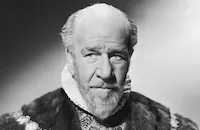
Henry Stephenson
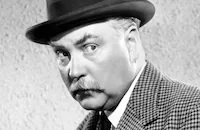
Nigel Bruce

Gladys Cooper

Philip Merivale
Sara Allgood

Alexander Knox

Queenie Leonard

Melville Cooper
Jill Esmond

Holmes Herbert
Denis Green
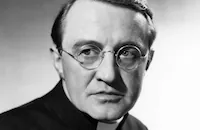
Arthur Shields
Dennis Hoey
Thomas Louden

Miles Mander

Rhys Williams
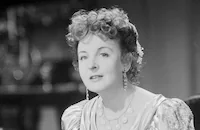
Doris Lloyd

John Abbott
Carol Curtis-brown
Gwendolyn Logan
Mary Field
Mary Forbes
Forrester Harvey
Olaf Hytten
Yorke Sherwood
Harold De Becker
Alec Craig
Jessica Newcombe

Billy Bevan
Aubrey Mather
Lumsden Hare
Heather Thatcher
Jean Prescott
Stella Rae
Cecil Weston
Brenda Forbes
Rita Page
Clare Verdera
Joyce Wynn
Valerie Cole
Stephanie Insall
Dorothy Daniels
Alan Edmiston
Gerald Hamer
Morton Lowry
Ernie Stanton
Wyndham Standing
Mrs. Wilfrid North
Clifford Severn
David Clyde
Lilyan Irene
Sylvia Chaldecott
Gordon Wallace
Anita Bolster
May Beatty
Donald Stuart
Clyde Cook
Harry Allen
Stuart Robinson

Charles Irwin
Will Stanton
Cyril Thornton
Leyland Hodgson
Herbert Clifton
Val Stanton
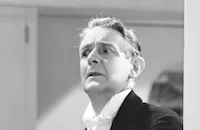
Leonard Carey
Virginia Mcdowall
Raymond Severn
Ottola Nesmith
David Thursby
John Rogers
Colin Campbell
Connie Leon
Crew
Robert Bassler
Richard Day
Major Douglas Francis
Roger Heman
Section Officer Iris Houston
Flight Lieutenant Kathleen Hunt
Robert T. Kane
Arthur Von Kirbach
Thomas Little
Arthur Miller
Alfred Newman
Guy Pearce
Aaron Rosenberg
R. C. Sherriff
Walter Thompson
Gwen Wakeling
Joseph C. Wright
Darryl F. Zanuck

Film Details
Technical Specs

Award Wins
Best Art Direction
Award Nominations
Best Cinematography
Best Editing
Best Sound
Articles
This Above All
Set in not-so-merry England after World War II has broken out, This Above All begins in a posh estate where - war or no war - life for the wealthy Cathaway clan goes on as cozily and comfortably as ever. The privileged class is enjoying its privileges, to paraphrase Jimmy Stewart in The Philadelphia Story (1940), and international upheavals seem distant and irrelevant. Only one member of the household - young, spirited Prudence Cathaway, energetically played by Joan Fontaine - has an emotional stake in the conflict, as we discover when she makes a fiery dinner-table argument about the need for England to persevere and win at any cost. Then she takes action, signing up for the Women's Auxiliary Air Force over her family's objections, which sound to her like "words oozing from the holes of a moth-eaten sofa."
Prudence promptly heads off to the WAAF for basic training, where she fits right in despite her high-toned background. In fact, everyone fits right in - no Full Metal Jacket (1987) here - and at night they all relax and have fun. Helping a friend who needs privacy so her boyfriend can propose, Prue accepts a blind date with the boyfriend's buddy: a soldier named Clive Briggs, played by Tyrone Power with a quiet, elusive sort of charm. Like all cinematic first dates, this one gets off to a shaky start. Clive is a small-d democrat with a lot of animosity toward aristocracies, and he lets rip with a rant before finding out where Prue hails from. Taking this in stride, she agrees to a tentative rendezvous the next day. The rendezvous takes place and everything goes wrong, from the weather to the bus schedule. So naturally the two fall crazily in love.
The future looks bright, especially when Prue and Clive go on vacation together, thanks to Prue's week-long military leave. But there's darkness at the end of the tunnel, and careful viewers will already suspect something is askew in this romance. Clive seems strangely eager for Prue to switch from uniform to civilian clothes, and he never has any orders or restrictions to bother with. The truth comes out when his old friend Monty, beautifully played by Thomas Mitchell, pays a visit to the old hotel where Clive and Prue have made a contented niche for themselves.
There we learn the shocking fact that Clive is a deserter. Although his reasons for deserting are a tad murky, he evidently fought courageously - indeed, he's up for a medal - until he was overwhelmed by the horrific death and destruction he witnessed at the front. In any case, the consequences will be disastrous if he doesn't turn himself in pronto. But he doesn't. Instead he leaves Prudence and hikes into the countryside, where he encounters a soldier who thinks he's a spy, a farmer who thinks he's a trespasser, a nurse who heals his injured hand, and finally a vicar who advises him to look at the spiritual side of things. It remains to be seen whether the latter's counsel will make a difference in his pessimistic, fatalistic outlook.
Directed by Anatole Litvak, whose next six films were government-sponsored war documentaries, This Above All lives up nicely to its high-minded opening titles, especially after Clive has his little chat with the vicar. This was what the filmmakers intended, since 1942 was the year when Twentieth Century Fox decided that with America and its allies at war, thought-provoking pictures about weighty topics would be both profitable and patriotic. The trend continued when the war was over, producing such memorable social-problem films as Edmund Goulding's The Razor's Edge (1946), about the clash between faith and materialism; Elia Kazan's Gentleman's Agreement (1947), about anti-Semitism; Litvak's own The Snake Pit (1948), about abuses in a mental hospital; and Kazan's Pinky (1949), about racism. The studio invested a good deal of talent in This Above All, assigning the reliable screenwriter R.C. Sherriff to adapt the eponymous novel by Eric Knight, whose best-known legacy isn't this war novel but the creation of Lassie, everyone's favorite collie. The gifted cinematographer Arthur Miller shot the picture, which was scheduled for filming in England until fears of war-related disruption prompted a last-minute switch to Hollywood.
The cast is the movie's best asset, and the cast's best asset is Fontaine, who came to This Above All fresh from top-flight performances in two Alfred Hitchcock classics: Rebecca (1940), which brought her an Academy Award nomination, and Suspicion (1941), which brought her the Academy Award itself. New York Times critic Bosley Crowther exaggerated only a bit when he called her "lovely and tender and believable," and her speech about the importance of England is indeed "one of the high points of the film." Power is sturdy if not inspired as Clive, and Mitchell is excellent as always. Nigel Bruce, another veteran of Rebecca and Suspicion, also stands out as Ramsbottom, a Dickensian innkeeper. Trusty supporting players like Sara Allgood, Melville Cooper, Jill Esmond, and Miles Mander make the most of various small roles.
Its lofty ambitions notwithstanding, This Above All had a fair amount of trouble with Hollywood censors, who were especially miffed at the idea of unmarried Prudence and Clive going off together for a week and even staying in the same hotel. After corresponding with the Production Code office, producer Darryl F. Zanuck agreed to make the affair less torrid than in Knight's novel, and the revised version of the script makes it clear that the lovers are sleeping in separate rooms. Watch closely, though, and you'll see a perfectly good doorway between those rooms, suggesting that the lovers can do all the loving they want as long as they tiptoe back and forth. Good for them.
Director: Anatole Litvak
Producer: Darryl F. Zanuck
Screenplay: R.C. Sherriff; based on Eric Knight's novel
Cinematographer: Arthur Miller
Film Editing: Walter Thompson
Art Direction: Richard Day, Joseph C. Wright
Music: Alfred Newman
With: Tyrone Power (Clive Briggs), Joan Fontaine (Prudence Cathaway), Thomas Mitchell (Monty), Henry Stephenson (General Cathaway), Nigel Bruce (Ramsbottom), Gladys Cooper (Iris Cathaway), Philip Merivale (Dr. Roger Cathaway), Sara Allgood (Waitress), Alexander Knox (Rector), Queenie Leonard (Violet Worthing), Melville Cooper (Wilbur), Jill Esmond (Nurse Emily)
BW-110m.
by David Sterritt

This Above All
Quotes
Trivia
Notes
The title of the picture and Knight's novel is derived from a soliloquy delivered by "Polonius" in William Shakespeare's play Hamlet: "This above all: to thine own self be true,/And it must follow, as the night the day,/Thou canst not then be false to any man." According to a February 1941 Hollywood Reporter news item, three major studios, including Paramount and Twentieth Century-Fox, joined in a bidding war for the film rights to Eric Knight's best-selling novel This Above All. By July 1941, according to Los Angeles Times, Fox had secured the rights to the story for just over $100,000. (A Hollywood Reporter news item listed the sale at $35,000, however.) Treatment drafts and story conference notes contained in the Twentieth Century-Fox Produced Scripts Collection at the UCLA Arts-Special Collections Library indicate that Fox, vacillated as to whether to keep "Clive" alive or have him die at the end. In the final film, "Clive's" fate was left ambiguous, just as it had been in the novel.
According to information contained in the file on the film in the MPAA/PCA Collection at the AMPAS Library, an early version of the script submitted to the PCA was found to be in violation of the Production Code on grounds that it was a "story of illicit sex without the compensating moral values required by the Production Code." In a letter to Fox, the PCA noted that the story did not present the "correct standards of life" regarding the depiction of two unmarried people "going away for a week, for immoral purposes." In defense of the story, Fox alluded to two earlier films with similar subject matter, Farewell to Arms (Paramount, 1932) and The Old Maid (Warner Bros., 1939), which had been approved by the Hays office. According to a PCA memorandum dated November 7, 1941, the agency was unconvinced by the studio's argument, and offered specific suggestions as to how to change the script to meet the requirements of the Code. On November 10, 1941, Zanuck composed a four-page reply to the PCA, in which he accused the agency of ignoring the submitted script and instead basing its opinion on Knight's novel and the first draft of the script. Zanuck also pointed out that Fox had eliminated from the story the illegitimate pregnancy and the illicit love affair.
In early March 1942, after submitting another revised version of the script, Fox was informed that the new script also did not meet the provisions of the Production Code. The PCA then suggested specific changes that would make the script acceptable, including the addition of a scene that would clearly indicate that "Prue's action in going off for a weekend with Clive was not the right or acceptable thing to do." Choosing not to appeal the PCA's decision, Fox revised the script and won the PCA's approval. The Variety and other contemporary reviews called attention to the changes Fox made in adapting the novel to film, especially the "toning down" of the love affair between the protagonists. In the film, one sequence specifically shows that the couple occupied separate rooms at their hotel.
A July 1941 Hollywood Reporter news item notes that production was to begin in Shepherd's Bush, England, in late September 1941 under the supervision of Robert Kane. In August 1941, a Hollywood Reporter news item stated that Zanuck would be leaving for England to personally supervise the production, and that film editor Otho Lovering would be accompanying Zanuck, Kane and screenwriter R. C. Sheriff. Lovering was replaced by Walter Thompson by the time production on the film began. A mid-September 1941 Hollywood Reporter news item noted that Fox planned to spend a total of $6,500,000 on six films scheduled for shooting at Shepherd's Bush, and that This Above All was set to receive the largest share of that money. By late Sep, 1941 however, contemporary news items reported that plans to shoot the film in England had been canceled, presumably because of the war, and that Zanuck had taken over supervision of the production from Kane, whose new assignment was to film only background footage in England. In addition to delays caused by the change in location, Fox, according to Hollywood Reporter, postponed the start of production in mid-November to give Tyrone Power, who had just completed his role in Son of Fury, a brief rest. The film was delayed again in late November to give Power and Joan Fontaine more time to rehearse their love scenes.
Contemporary sources indicate that Fox had, at different times, considered Robert Donat, Laurence Olivier and Richard Greene for the part played by Power. An October 1941 Fox memorandum contained in the Twentieth Century-Fox Records of the Legal Department at UCLA lists the following "cast suggestions" (apparently made by director Anatole Litvak): Alan Hale or Nigel Bruce for the role of "Monty"; Dennis Holley for "Prue's" father; Wyndham Standing for "General Cathaway"; Florence Bates or Isabel Jeans for "Iris"; Una O'Connor for the waitress; and Cedric Hardwicke for the rector. Modern sources note that Fontaine, who was loaned to Fox from David O. Selznick's company, initially rejected her assignment to the film and only accepted it when Selznick threatened her with suspension.
According to studio publicity materials and contemporary news items, a $26,000 set, designed to match the look of the background footage shot in England, was constructed on a Fox sound stage. English illustrator William Bagdatopolus drew sketches of the English countryside to aid art director Richard Day in designing the sets. By November 1941, according to Hollywood Reporter, 3,000 feet of background footage had already been filmed in England. According to Hollywood Reporter, technical advisors Kathleen Hunt and Iris Houston were officers of the British Women's Auxiliary Air Force. The Hollywood set was a replica of the exterior of a WAAF encampment that included seventeen buildings and dirt roads.
Virginia McDowall, who appeared in the film as a young girl, was the sister of actor Roddy McDowall. On May 29, 1942, two weeks after its world premiere in New York, the film had its west coast premiere at the Fremont theater in San Luis Obispo, CA. This Above All was the first film to be shown in the newly constructed theater, and the event reportedly drew many celebrities, including Laurel and Hardy, Jackie Cooper and Joe E. Brown. In the summer of 1942, Lux Radio Theatre aired a radio adaptation of the story, starring Tyrone Power, reprising his film role, and Barbara Stanwyck. The film received an Academy Award for Best Art Direction-Interior Direction, and was nominated for Oscars for Best Cinematography, Best Sound Recording and Best Film Editing.














